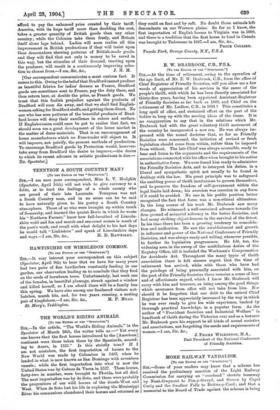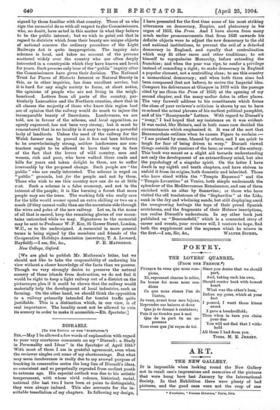of national concern the ordinary procedure of the Light Railways
Act is quite inappropriate. The inquiry into schemes is local, and takes no account of the persons scattered widely over the country who are often deeply interested in a countryside which they have known and loved for years. Such persona only hear of the " public" inquiry after the Commissioners have given their decision. The National Trust for Places of Historic Interest or Natural Beauty in this, as in other inquiries, has done excellent service, but it is Lard for any single society to focus, at short notice, the opinions of people who are not living in the neigh- bourhood. Letters from all parts of the country, par- ticularly Lancashire and the Northern counties, show that in all classes the majority of those who know this region best are of opinion that the railway would do much to injure the incomparable beauty of Snowdonia. Landowners, we are told, are in favour of the scheme, and local opposition, as openly expressed, has not been very strong ; but it must be remembered that in no locality is it easy to oppose a powerful body of landlords. Unless the need of the railway for the Welsh farmer can be proved (as it has not been hitherto) to be overwhelmingly strong, neither landowners nor con- tractors ought to be allowed to have their way in face of the fact that the lovers of wild country, men and women, rich and poor, who have walked these roads and hills for years and taken delight in them, are to suffer irrevocably by the proposed change. Such people are "the public" who are really interested. The scheme is urged on "public" grounds, but for the people and not by them. Those who wish to see this country now can do so at little cost. Such a scheme is a false economy, and not in the interest of the people ; it is like burning a forest that more people may see the trees. The working folk who really care for the bills would sooner spend an extra shilling or two on a coach (if they cannot walk) than see the mountain-side through the wires and poles of the new railway. Let us, in the name of all that is sacred, keep the remaining glories of our moun- tains untouched while we may. Signatures to the memorial may be sent to Professor W. P. gar, 95 Gower Street, London, W.C., or to the undersigned. A memorial in more general terms is being signed by the members and friends of the Co-operative Holidays Association (secretary, T. A. Leonard,
Hayfield).—I am, Sir, &c., P. E. MATHESON. New College, Oxford.
[We are glad to publish Mr. Matheson's letter, but we should not like to take the responsibility of endoreing his view without a closer knowledge of the facts than we possess. Though we very strongly desire to preserve the natural scenery of these islands from destruction, we do not feel it would be right to keep a light railway out of a district on the picturesque plea if it could be shown that the railway would materially help the development of local industries, such as farming. On the other hand, we should think the opposition to a railway primarily intended for tourist traffic quite justifiable. This is a distinction which, in our view, is of real importance. The locality must not be allowed to ruin its scenery in order to make it aosessible.—En. Spectator.]
DISRA WA.
[To Toe EDITOR or Ton •erSOTATOa.•1
I have presented for the first time some of his most striking utterances on democracy, Empire, and plutocracy in bin organ of 1853, the Press. And I have shown from many much earlier pronouncements that from 1833 onwards his definite objects were to adjust the new democracy to the old and national institutions, to prevent the evil of a detached democracy in England, and equally that centralisation which may fit other races and other traditions ; to set himself to repopularise Monarchy, before extending the franchise; and when the pear was ripe, to confer a privilege instead of conceding a right; to make democracy in England a popular element, not a controlling class; to see this country a monarchical democracy; and when both these aims had been compassed (but not before), to revive the Imperial idea. Compare his deliverance at Glasgow in 1873 with the passage cited by me (from the Press of 1853) at the opening of my second chapter, and the many earlier dates in other places. The very farewell address to his constituents which forms the close of your reviewer's criticism is shown by me to have re-echoed the actual phrases of his earliest political pamphlet, and of his " Runnymede" Letters. With regard to Disraeli's "irony," I had hoped that my insistence on it was evident. It was racial, like Heine's, and in both cases race decided the circumstances which emphasised it. It was of the sort that Beaumarchais outlines when he causes Figaro to exclaim :— " I am praised by some, blamed by others, and I am quick to laugh for fear of being driven to weep." Disraeli viewed things outside the passions of the hour, or even of the century. This book was meant as a slight aid towards understanding not only the development of an extraordinary mind, but also the psychology of a singular spirit. On the latter I have dwelt in my eighth and tenth chapters, and have striven to unfold it from its origins, both domestic and inherited. Those who have stood within the "Temple Espanol" and the " Tempio Levantino " at Venice, both simple underneath the splendour of the Mediterranean Renaissance, and one of them enriched with an altar by Sansovino ; or those who have visited the old tombstones of the " Sephardim " at the Lido, sunk in the dry and whelming sands, but still displaying amid the overgrowing herbage the tope of their proud Spanish scutcheons, and the fragments of their Hebrew inscriptions, can realise Disraeli's understrain. In my other book just published on "Beaconsfield," which is a connected story of career and events, your reviewer will, I venture to hope, find both the supplement and the sequence which he misses in the first. —I am, Sir, &c., WALTER SICHEL,
POETRY.
THE LOVERS' QUARREL. (FROM THE FRENOH.*)
PUISQIIE to yeas qua nous rom- Since you desire that we should
pions, Et, reprenant chacun le mitre, De bonne foi nous nous ren- dions Ce qua nous camas l'un de l'autre,
le yens, avant tons mes bijoux, Iteprendre °es bailers si dour Qua je to donnai k centaines ; Pais it ne tiendra pas Is moi Quo de to part to ne re-
preunes Tons ceux quo j'ai recus de tor.
ART.
IT is impossible when looking round the New Gallery not to recall one's impressions and memories of the pictures that were hung here last January by the International Society. In that Exhibition there were plenty of bad pictures, and the good ones were not the crop of one • Furotidre, l'oeslea Dillalle9." Paris, IOU,











































 Previous page
Previous page